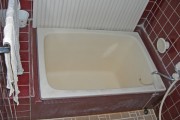Apparently, strongly-scented fabric softeners have been causing Japanese consumers to feel ill in recent years.
To try and stop people from using fabric softener so much, Japanese netizens have been retweeting this article and commenting about their own experiences with fabric softeners.
But is it a consumer conspiracy? Or are fabric softeners really damaging to your health? And given that netizens recently decided to shun shampoo, is this part of a larger movement to embrace our natural odours?
From Mainichi Shimbun:
<Fabric Softeners>: The Number Of People Who Claim That ‘Strongly-Scented’ Types Are Bad For Your Health Is On The Rise
The number of people bringing to attention that the scent of fabric softeners used for laundry is bad for your health is increasing. According to the National Consumer Affairs Centre of Japan, the number of complaints they have received saying that the scent of fabric softeners causes their “noses and throats to hurt” and to “feel ill” has suddenly increased from 5 in 2009 to 48 in 2012. Recent fabric softeners that have a long lasting, lingering scent, called “strongly- scented” types, are said to be popular, but officials are saying that people should be cautious of using them in excess.
At a clinic in Sapporo that treats patients with Sick Building Syndrome and chemical sensitivity patients, the number of patients who blame their symptoms on the scent of fabric softeners from inside trains and buses, and even from next door neighbour’s houses is on the rise. The main symptoms include headaches, nausea and fatigue. Clinic Director Watanabe Kazuhiko said in surprise, “several years ago we didn’t really have this”.
A major detergent maker’s representative said in regards to the strong scent type fabric softeners that, “in the previous financial year, the amount sold has grown 1.4 times”. In this maker’s biannual consumer survey, when asking consumers for a good point about the detergent they bought, since 2005 “the scent is good” is consistently the top answer. This exceeds responses related to the original purpose of fabric softener, such as “the texture is good when it’s used”, and in the survey carried out during the second half of 2011, this went up by nearly 70%.
Detergent makers have hypothesized that there are many consumers who use more fabric softener than they should. Another brand of fabric softener stated on the product packaging that “if you want to enjoy the scent more, increase the amount as you like”, while on the manufacturer’s website it advises “use no more than two times the standard amount”.
On the other hand, in Kanagawa prefecture in 2011, 15 domestic and foreign fabric softeners using a weak concentration were researched. The scent’s strength showed on the smell index and for most of the products, the residential area’s factory drainage regulations were average.
The Ministry of Health, Labour and Welfare’s Sick House problem investigative commission’s Satoshi Nakai, a Yokohama National University professor (study of environmental epidemics), pointed out that “the majority of people with a sensitivity to chemical substances are unable to withstand the smell of tobacco and perfume”. An incorporated nonprofit organization, “Chemical Sensitivity Support Center” Head Secretary Shinobu Hirota also brought to attention that “with tobacco smell too, people who smoke are comfortable, but there are also lots of people who don’t like the smell. I want people to think the same about the fragrance of fabric softener”.
These fabric softeners declare that they have a strong scent that is long lasting on clothing. Sales messages such as “Fresh scent goes on and on”, “lasts even when you are wearing it”, “the scent revives when worn” and so on, are emphasizing the strength of the scent rather than the softness once the fabric softener is used. From 2008-2010, three large companies released products in succession, and the total sales of fabric softeners increased one and a half times. The scent is made through the use of synthetic perfumes, which are a combination of many chemicals including methyl-anthranilic acid and dihydroxy xylic acid methyl.
Comments from Twitter:
友葉すん:
I really want this to stop ><
shigen t:
I hate the smell of fabric softeners so I don’t use them. Recently there seems to be lots of people falling ill due to the smell of fabric softeners.
うさうさ うさ子:
I also have a good sense of smell so I’m the type who can’t use perfume or strong scents. (´・ω・`) When I smell strong scents my nose gets itchy and I sneeze. (´・ω・`)
坂口 きりこ:
I completely understand this.
momomo:
〜Scent of Danger〜(´・_・`)
sumisumi:
I had a feeling that recent fabric softeners have got a strong scent.
Brownベア:
They are saying people who use fabric softener should be careful of using it in excess.
のり:
This is about Downy [a brand of fabric softener] isn’t it, I know it is.
Aya. (アラフェス当たれ~):
I have a strong sense of smell so I really want to see an end to things with a perfume.
ysfm:
I fall ill walking past some shops selling soap…
Eiji:
I have felt ill at the scent of girls’ shampoo on their hair.
mizzi:
I also suffer from this(*_*; to people who say 「‘recently the scent has weakened so I use double amount」 – please use the recommended amount! Because you’re only paralyzing our noses~!
児玉源太郎:
My friend is suffering from this problem. Please read about this on mixi [Suffering from fragrances@fabric softeners]
米谷 仁志:
One way or another it’s a hard world to live in…
my way 701:
Personally I like good fragrances♪
イノウエカナコ:
From someone who is weak with perfumes, this is close to torture. When people who are not good with perfumes sit next to someone using perfume on the train, we change to another seat immediately.
美魔女って痛いの?キレイになりたい:
I like the scent of Renoa Happiness [a type of fabric softener] but I guess I have to be careful~
ほしひ子:
There are people saying this!
ケイ:
Because I find the smell of normal fabric softener and even perfume a bit unpleasant, I have never bought strong scented fabric softeners. But it seems that’s for the best.








